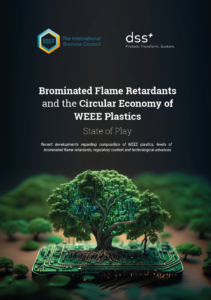New Study Sheds Light on Brominated Flame Retardants in WEEE Plastics and their integration into Europe’s Circular Economy
Brussels, [25 September 2023] – Have you ever wondered how we could make electronic waste recycling more efficient and sustainable in Europe?
A new study commissioned by BSEF – the International Bromine Council – and conducted by dss+, answers this question.
As Michael Hack, BSEF Secretary General highlights: “ Our new study reveals key insights into the present state of Waste Electrical and Electronic Equipment (WEEE) plastics recycling in Europe. More precisely, it shows how BFR-containing WEEE can be integrated in the circular economy, as well as the current regulatory framework and new technological advances in the fields of mechanical and chemical recycling”.
The Crux of the Matter
We generate a staggering 2.6 million tonnes of electronic waste annually in Europe. Such plastics also contain a wide range of additives such as flame retardants (typically brominated or phosphorous-based), fillers, pigments and stabilisers.
What’s more important, is that a significant portion of it is represented by engineering polymers, which are types of plastic materials that are very durable and robust and therefore have a high market value and good theoretical recyclability.
However, in 2021, only 54% (1.4 million tonnes) of all WEEE plastics were collected through official WEEE channels. The remaining 46% were either treated as scrap metal or disposed of with mixed waste, while others were exported outside Europe, legally or illegally, raising serious concerns about unsafe recycling practices.
Our study explores the ins and outs of these recyclable plastics, particularly those containing Brominated Flame Retardants (BFRs), analysing what can be done to address the issue of improper disposal.
The Upside
Our research shows a consistent and continuous decline in the levels of restricted BFRs in WEEE plastic streams, which is good news for environmental safety. This is also the result of several old flame retardants being discontinued. For instance, the average share of PBDEs in the total bromine content has decreased from above 20% in 2015-2016 to below 10% in 2021-2022. However, occasional high PBDE levels may still be found in WEEE streams due to the presence of older devices manufactured before regulatory restrictions were in place.
Interviews with WEEE plastic recyclers also support the notion that BFR plastics are well-controlled and easily sorted during conventional recycling processes.
Challenges Ahead
Upcoming EU regulatory changes could complicate the recycling landscape, in particular the recycling of WEEE plastics. For instance, proposed changes in regulatory threshold for wastes (LPCL) and products (UTC) containing restricted BFRs (HBCD and PBDEs) will pose significant challenges to WEEE plastics recycling, due to the lack of reliable sampling, sample preparation and analytical methods to measure BFR concentrations below 1,000 ppm in heterogeneous materials. As a lowering of levels will result in additional challenges for recyclers, balancing environmental goals with technological capabilities is crucial to ensure effective implementation.
Proposed revisions in waste shipment regulations could also challenge the proper management of WEEE plastics, leading to increased costs and administrative hurdles, which may further impede recycling efforts and cross-border waste trade.
The Future Looks Bright
Innovative technologies like solvent-based recycling, pyrolysis, or depolymerisation, are showing promise as alternative approaches for recycling these challenging plastics. However, they’re not without their own sets of challenges, such as cost, scalability and the need to ensure compatibility with existing recycling infrastructure.
Actionable Steps
To make the most of electronic waste recycling, some key recommendations from the report include:
- Raise Awareness: Through campaigns, convenient collection points and mandatory collection targets that can enhance the separate collection of WEEE, thereby ensuring proper disposal of BFRs and the reuse of plastic waste. This enhanced cooperation between stakeholders will also help prevent illegal exports and ensure proper recycling processes.
- Harmonise Regulations: Common and consistent rules at the international level can ease the recycling process by avoiding conflicting requirements. It’s also important to consider the practicality of UTC levels and the availability of reliable analytical methods.
- Invest in Innovation: R&D support can lead to promising alternative recycling methods.
- Harness Data: A centralised database can inform the development of new technologies and regulations.
- Collaborate: Facilitate collaboration between WEEE recyclers and manufacturers to promote the use of recycled plastics in new products.
Conclusion
As Europe strives to build a more sustainable and circular economy, dss+ study’s findings offer an insightful and updated overview on WEEE plastics recycling. From optimising collection systems to navigating regulatory changes and adopting innovative technologies, the path forward will require a collaborative, multi-stakeholder approach.
Dive Deeper – Read more and watch our webinar
Curious to learn more? You can read the full study here and watch the full video recording of our dedicated seminar here, which took place on 9 October 2023 and where the study’s findings were presented, with introductory and closing remarks from Bob Miller, Vice President of Regulatory Affairs of Albemarle & Chairman of the Board of BSEF, Michael Hack, BSEF Secretary General, and Sander Kroon of ICL and BSEF Advocacy / Recycling WG Chair.
About BSEF
BSEF – the International Bromine Council, is the global representative body for bromine producers and producers of bromine technologies. Originally founded in 1997, BSEF works to foster knowledge of the societal benefits of bromine and its applications. The members of BSEF are Albemarle Corporation, ICL Industrial Products, Lanxess, Tosoh, and Shandong Haiwang Chemical Ltd.
Further information:
Michael Hack, Secretary General, BSEF (mhack@bsef.org)
For further information on BSEF, bromine, and bromine applications, visit www.bsef.org to learn more, and follow BSEF on LinkedIn and X @BromineInfo for the latest news and information.




